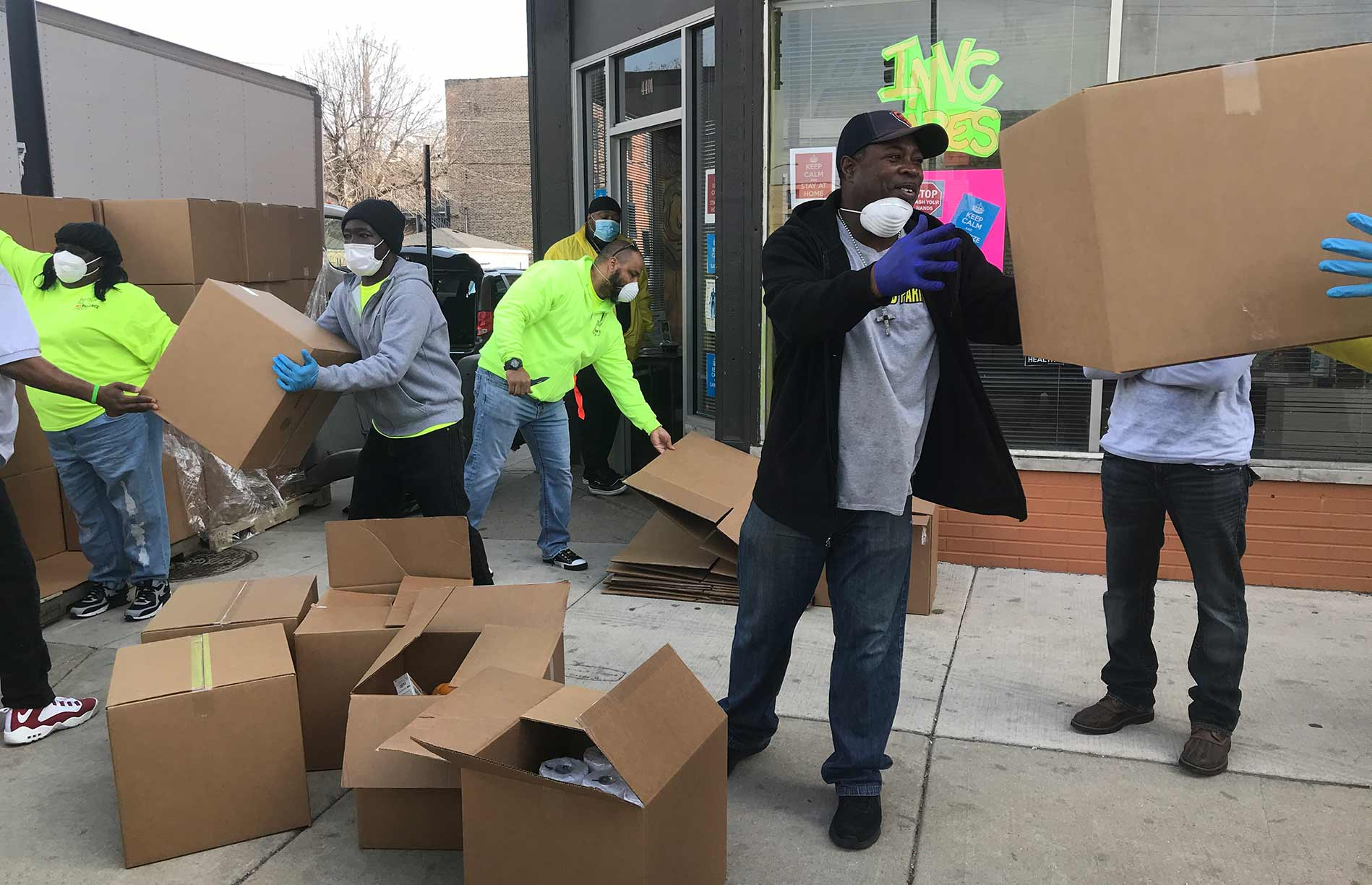Access Living, Teamwork Englewood, and Mujeres Latinas en Acción have adapted their work to meet the extraordinary needs their communities face during the pandemic.
For people with disabilities, the COVID-19 pandemic has been particularly unsettling.
Already vulnerable to existing health issues, they now face a loss of services, isolation, and worst of all, a deadly virus.
But community connection can ease some of these anxieties, as people with disabilities work together to identify needs and come up with solutions.
“My theme word is ‘zoomtastic’ right now,” said Candace Coleman with a laugh. As Access Living’s racial justice community organizer, she has been connecting with her community members regularly throughout the pandemic via Zoom, the online meeting platform.
While its immediate threat was obvious to people in the disability rights community, the pandemic laid bare long-standing barriers and inequities several historically marginalized communities already faced. Those disparities include lack of accessible healthcare, affordable housing, and jobs. Long-term recovery efforts will require an intersectional approach that focus on the people and places in greatest need.
Access Living, Teamwork Englewood, Mujeres Latinas en Acción, and dozens of other grassroots nonprofits are well positioned to empower and support people and communities disproportionately affected by the pandemic and its economic fallout. They are building on their nonprofits’ deep community connections to give voice to the wisdom and experience of those closest to the challenges.
“It’s almost this repetitive cycle of fighting for basic life necessities,” Coleman said.
Access Living President and CEO Karen Tamley and her organization are addressing the immediate needs of people with disabilities during the COVID-19 pandemic.
Throughout the pandemic, Access Living has continued providing direct services and resources—including money for food, personal protective equipment for people with disabilities and for the assistants they rely on, and moral support—while pushing to make sure that disability rights are front and center in policy decisions.
Before the pandemic, Coleman focused on developing alternatives to calling 911 for people in crisis. Those calls too often result in police misunderstanding and mistreating people of color with disabilities and mental health issues.
Coleman’s work has helped keep those in the disability rights community safe during the pandemic and unfolding economic crisis.
For example, Access Living is working with the state of Illinois to implement policies ensuring that people with disabilities and people of color are treated fairly in the healthcare system.
Access Living is also supporting a statewide network of emergency personal care assistants because reliability has become more difficult now that providers are falling ill and being quarantined.
In addition, Access Living is getting basic health and service information to people without computers and checking on clients regularly.
Institute for Nonviolence Chicago (INVC) is another organization that has seen its outreach workers and volunteers take on multiple roles: distributing food, handing out flyers to dispel myths about COVID-19, and continuing to reduce violence in neighborhoods.
“It was instinctual for us to adopt our public health work,” INVC Executive Director Teny Gross said. The organization can reach populations that authorities cannot and uses its constant presence in the neighborhoods to respond quickly to needs brought on by the pandemic and those needs that existed before, he added.
Urgent Help to Hardest Hit Communities
On the South Side, Teamwork Englewood’s work to reduce violence over the years has built trust in the community. Now that trust is a valuable foundation as the organization provides food deliveries, gift cards, parenting help, employment advice, and more to residents of the predominantly African-American neighborhood the organization serves.
The support comes at a crucial time. Early data showed that more than 70 percent of COVID-19 deaths in Chicago were among African-Americans, who comprise 30 percent of the city’s population.
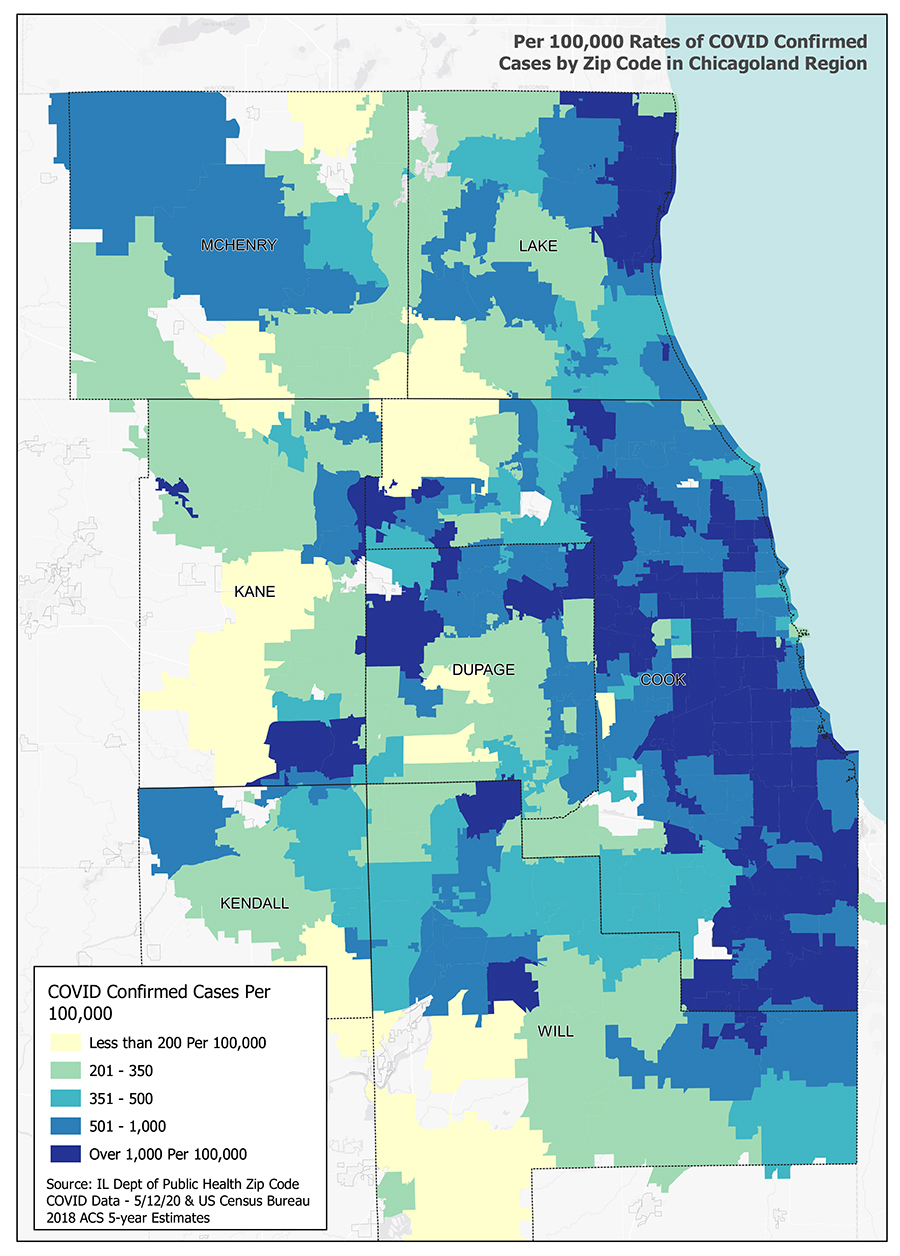
Maps, courtesy of The Chicago Community Trust, reflect data as of May 12, 2020, and ALICE Threshold represents Asset Limited, Income Constrained, and Employed.
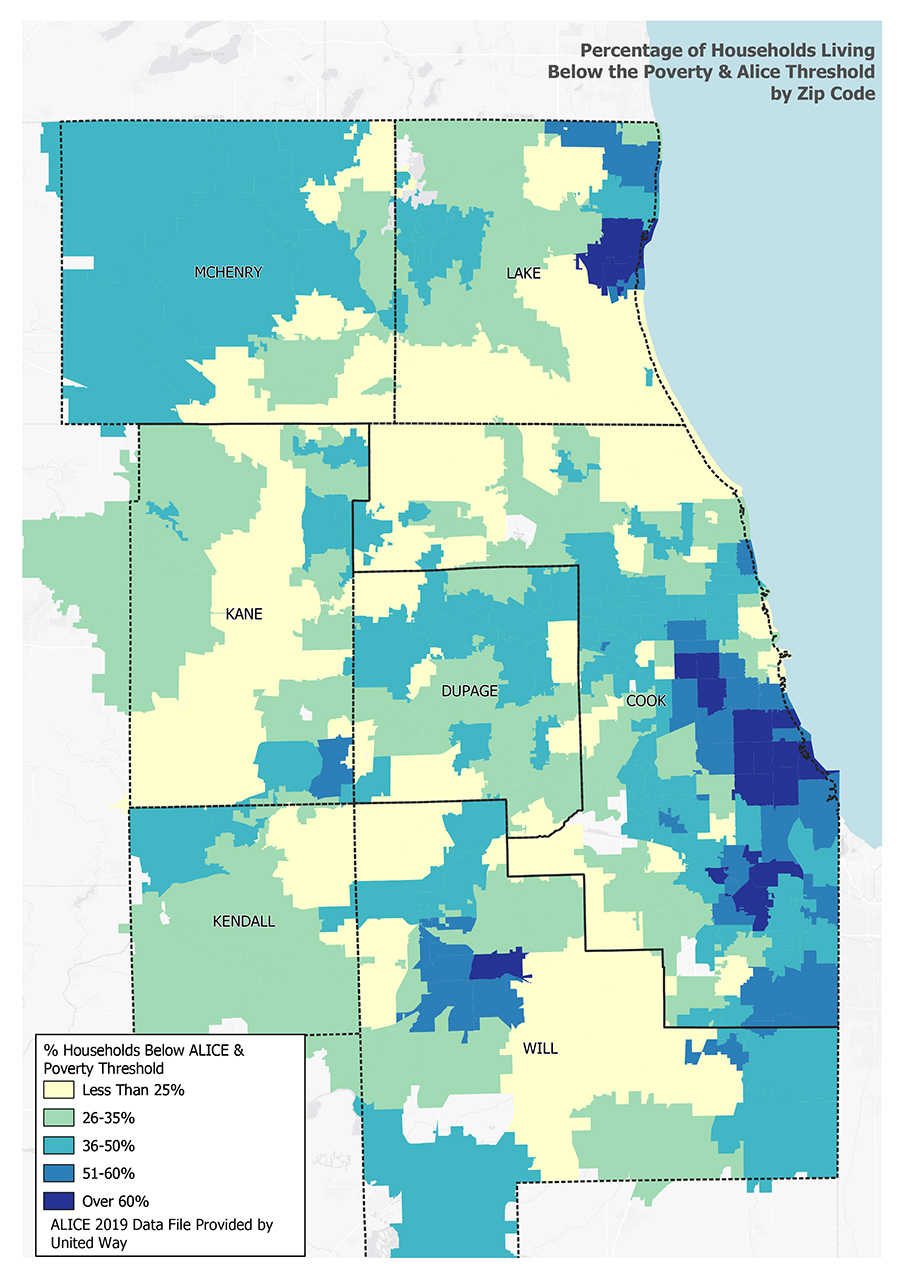
Teamwork Englewood Executive Director Cecile DeMello noted that the organization for years has focused on finding jobs for formerly incarcerated citizens. The pandemic-induced recession likely will hit those residents especially hard, largely because their backgrounds had already relegated them to jobs with little security and few benefits.
To help, DeMello says the organization may expand computer coding classes to all ages—training that was previously limited to young people. Also, Teamwork Englewood may focus job searches on landscaping and other sectors that may be less hard-hit and open to people returning from the criminal justice system.
“We’ve been examining the economic recovery after the recession” a decade ago, said DeMello, who is juggling work and helping her three kids continue their schooling from home. “We’re seeing how we need to advocate on behalf of our families and create programming that is resilient.”
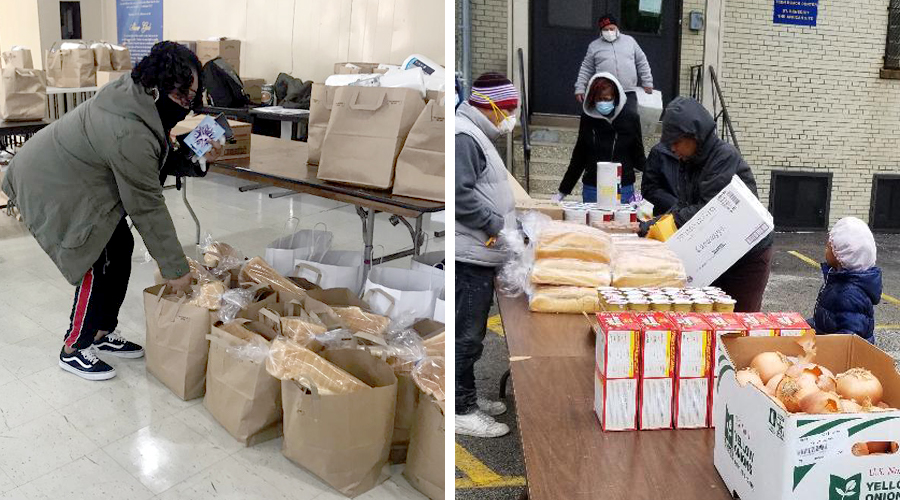
Englewood residents use protective masks and social distancing to safely obtain food and essentials during the pandemic.
Mujeres Latinas en Acción provides services and advocacy to Chicago-area Latinx families dealing with issues related to immigration, domestic violence, and homelessness, among others. By early May, the Latinx community accounted for the highest number of COVID-19 cases among all ethnic groups in Illinois, and in Chicago, made up 37 percent of the city’s coronavirus cases and 25 percent of deaths. Those numbers may undercount the actual percentages, largely because Latinx race and ethnicity were not accurately documented early in the pandemic.
Perhaps as a reflection of those numbers, Mujeres staff are seeing “tremendous” needs in the community now, added Neusa Gaytan, Mujeres’ Senior Vice President of Programs. Those include requests for help dealing with domestic violence, which has risen during the pandemic.
Given the confidentiality crucial to domestic violence support, connecting with clients by phone or videoconferencing can be especially difficult, Gaytan said.
Mujeres’ Parent Support and Latina Leadership Director Shatna Osornos noted that clients who are undocumented cannot collect unemployment or access other resources. Many likely have jobs deemed essential, which do not allow them to work remotely.
“Our clients work in factories, restaurants, places where there is no clarification of safety procedures, or providing of the supplies they need,” she said. “They need to be working, but they know they could be exposed [to the virus], then they go home to their kids. It creates a lot of stress.”
Many grassroots nonprofits face similar challenges, including staff grappling with their own health concerns. Their work is more critical than ever, but responding to the immediate needs of the individuals they serve has become more challenging.
Staff needed more self-care to cope with stress. Mujeres, for one, scheduled regular video staff meetings and check-ins to help, Gaytan said.
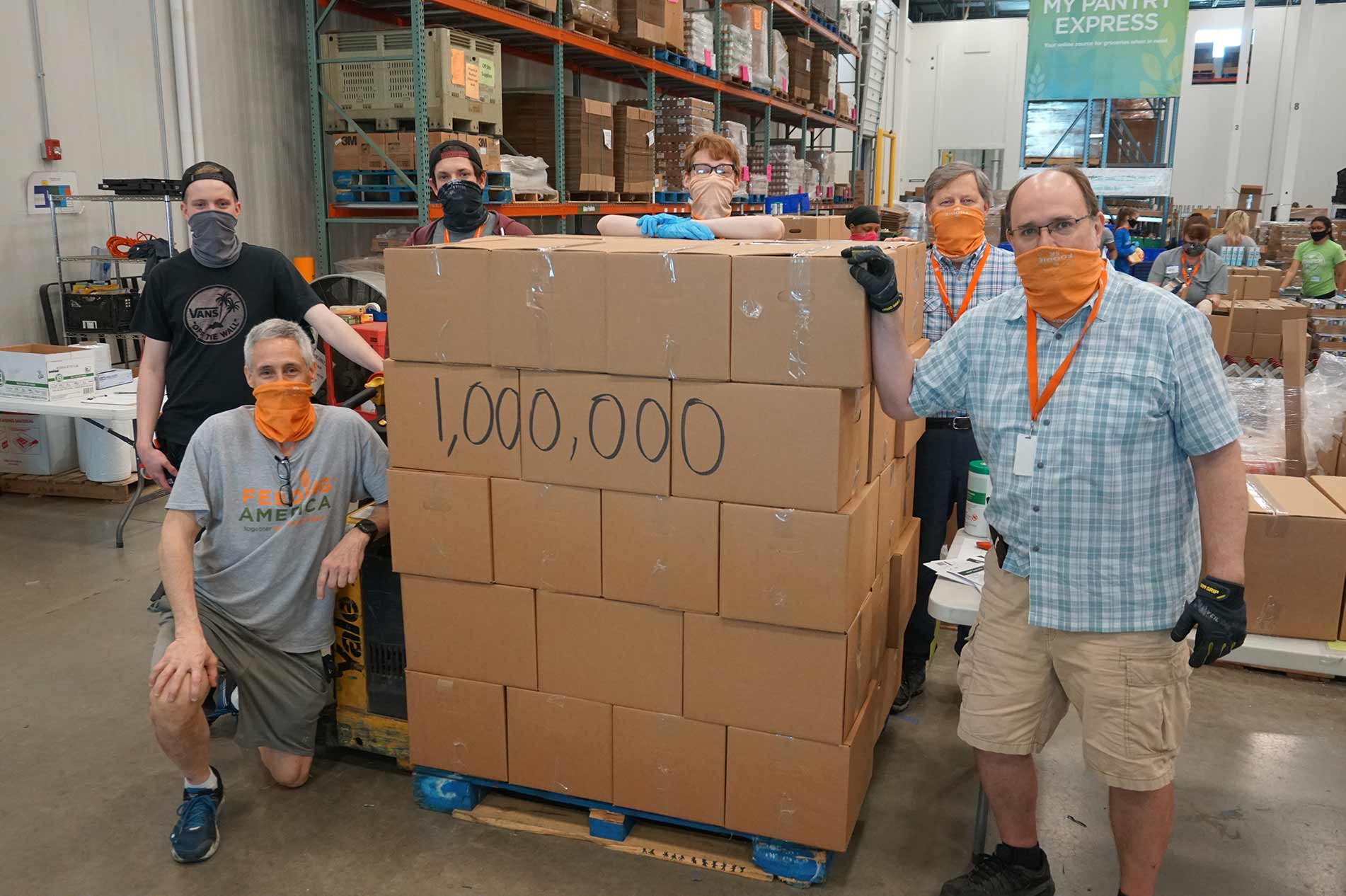
On April 28th, Northern Illinois Food Bank celebrated packing the 1 millionth pound of food into an Emergency Food Box since the COVID-19 crisis began.
Community leaders agree that just as the pandemic has highlighted longstanding injustices and disparities for their communities, it also can lead to enduring progress on those issues.
Karen Tamley, the President and CEO of Access Living, noted that for years the disability community pushed for accommodations such as teleworking and universal automatic no-touch doors and faucets—concepts and devices that are gaining wide acceptance during the pandemic.
In a broader context, the pandemic has shown how connected all Chicagoans are and how the empowerment, safety, and well-being of people who face the burden of structural inequities is essential for the whole city to survive and thrive.
“The cracks in the existing system are showing in new ways,” said Coleman. Through their work, the organizations hope to reveal new ways to fill those cracks and create a stable foundation.
Access Living, Teamwork Englewood, and Mujeres Latinas en Acción received funding through the Chicago Community COVID-19 Response Fund, which is supported by MacArthur. MacArthur also has provided direct grant funding to the three organizations. Access Living has received $800,170 since 1992; Teamwork Englewood received $520,000 since 2018; and Mujeres Latinas en Acción has received $286,750 since 1988.



